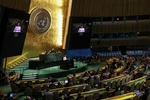
Customers of a power company operating in the southern Bosnian region of Herzegovina „Elektroprivreda Hrvatske Zajednice Herzeg-Bosne (EP ZHHB) received pre-written statements for them to sign, agreeing that they would like to donate 1 Bosnian mark via the electric bill for the financing of a newly established, private, Radio Television of ‘Herzeg-Bosna’ (RTV HB).
The idea was first suggested by the leader of the biggest Croat party in the country, Croat Democratic Union’s (HDZ BiH) Dragan Covic, who argued that the television station was very important for the Croat people in BiH and that it needs financial help.
"We have a very clear, special task for the Croat people. Since we have not already managed to provide a TV channel in the Croatian language through the institutions of BiH because we also had a vital national interest of the Bosniak people involved, I am sure that RTV HB can be a supplement to our path to ensure the
proper] information
of Croats]. I would like us all to get involved and strengthen our RTV HB in terms of personnel, technically and programmatically. How should we help? With the EP HZHB, we can give one Bosnian mark via the electric bill for this TV to strengthen it. I believe we will be able to do that from July 1st. One Bosnian mark doesn’t mean much for a Croat family, and in return, we get the program of the RTV HB," Covic last month.
https://twitter.com/damirmasic/status/1414901487604535296
Months before this suggestion, the government of the Republic of Croatia also donated 450,000 kunas (some €60,000) for the Mostar-based television.
In 2017, the UN Court for war crimes in the former Yugoslavia ruled against six top officials of the self-declared statelet of Herzeg-Bosna. They were sentenced to a total of 110 years in prison for crimes against humanity and a joint criminal enterprise (JCE) aimed at ethnically cleansing areas under Bosnian Croat control and annexing them to Croatia during the 1992-1995 Bosnian war. The verdict established that the aim was to turn Herzeg-Bosna into a part of greater Croatia and that Croatia’s leadership took part in the joint criminal enterprise.
The verdict added that the war crimes the Croatia-backed force committed while establishing in 1993 the Herzeg-Bosna statelet were “not the random acts of a few unruly soldiers.”
“On the contrary, these crimes were the result of a plan drawn up by members of the JCE (joint criminal enterprise) whose goal was to permanently remove the Muslim population from Herzeg-Bosna,” the 2017 judgement said.
It is also important to note that residents from the area where the EP HZHB operates are already financing the RTV HB via grants from local authorities. The institution of the state auditor determined, last year, that the Ministry of Education of the Herzegovina-Neretva Canton provided 220,000 Bosnian marks to the said television, labelling it as a “non-profit organisation.”
According to the Law on the Public Broadcasting System of BiH, from 2005, BiH has three public broadcasters (BHRT, RTRS and RTV FBIH) which are financed by the television fee. However, the method of collecting this fee is not regulated properly. The citizens of the Federation (FBiH) entity pay the fee via the electricity bill of Elektroprivreda BiH, while the citizens of the Republika Srpska (RS) entity can pay the fee in the post office without commission, and the Radio Television of Republika Srpska (RTRS) charges a subscription through its collectors.
Speaking to N1, former FBiH Media Ombudsman Mehmed Halilovic said in early July this year that the goal of the collection of one Bosnian Mark from the EP HZHB customers is to create another public emitter that will represent only one ethnicity in Bosnia, and that the HDZ and the Croat National Council (HNS) – an association of Croat parties in BiH, are behind it.
He said that the explanation that this was the residents’ voluntary decision whether to pay one Bosnian mark for the RTV HB Bosna or not - does not hold water, because it is a contract between a public company and a private television station.
"Voluntarily, people can give as much money as they want and to whomever they want. But that must not be done on the contractual obligation created by one private television and one public company such as Elektroprivreda HZHB," Halilovic concluded.
He added that it is also illogical to introduce a new form of payment for radio and television, which is not a legal part of the Public Broadcasting System in BiH, knowing that the collection of legal RTV fees for public emitters in BiH is at a minimum level in the territory covered by Elektroprivreda HZHB.
Kakvo je tvoje mišljenje o ovome?
Učestvuj u diskusiji ili pročitaj komentare





 Srbija
Srbija
 Hrvatska
Hrvatska
 Slovenija
Slovenija



























































